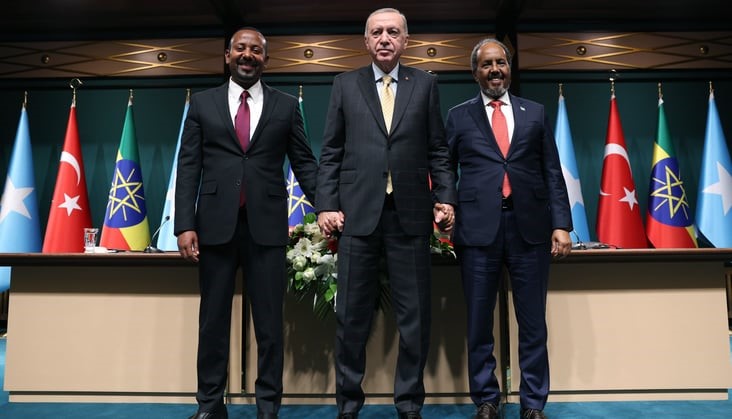Somalia’s policy needs to balance firmness on sovereignty with pragmatic engagement to address Ethiopia’s needs, using international and regional partnerships to pressure Ethiopia, while offering viable alternatives that serve both countries’ interests. Also, managing domestic opinion through transparent communication and ensuring any deal is perceived as beneficial to Somalia’s territorial integrity and economic development.
Somalia’s policy towards Ethiopia must navigate historical mistrust, territorial integrity concerns, and regional rivalries while addressing Ethiopia’s quest for sea access. Here’s a structured approach:
1. Diplomatic and Legal Assertiveness
Ankara Process Engagement: Prioritize technical committees in Ankara to negotiate Ethiopia’s sea access under Somali sovereignty. Demand Ethiopia formally void its Somaliland MoU as a precondition.
International Advocacy: Leverage the African Union and UN to affirm Somaliland as part of Somalia, pressuring Ethiopia to abandon unilateral deals. Highlight violations of territorial integrity under international law.
2. Domestic Unity and Communication
Public Diplomacy: Transparently communicate negotiations to Somalis, emphasizing sovereignty safeguards. Address grievances through inclusive dialogue to mitigate protests and build national consensus.
3. Economic and Security Incentives
Port Access Proposals: Offer Ethiopia conditional port access via a Somali-government-approved agreement, ensuring oversight and revenue-sharing. Tie access to Ethiopia’s disengagement from Somaliland.
Security Collaboration: Strengthen counterterrorism cooperation (e.g., against Al-Shabaab and ISIS) to build trust and mutual dependency.
4. Regional Balancing and Mediation
Neutralize Rivalries: Maintain cautious engagement with Egypt in forums like AUSSOM (likely a regional security initiative) without alienating Ethiopia. Use Turkey/Qatar as neutral mediators to ensure balanced outcomes.
Tripartite Dialogue: Explore indirect talks with Somaliland, incentivizing reintegration with autonomy guarantees while isolating Ethiopia’s unilateral moves.
5. Contingency Planning
Sanctions and Leverage: Prepare multilateral pressure (AU, Arab League) if Ethiopia persists with Somaliland. Highlight economic costs for Ethiopia, such as strained IGAD relations.
Alternative Partnerships: Deepen ties with Turkey, Qatar, or others for port investments, reducing Ethiopia’s leverage.
Key Considerations
Sovereignty First: Any agreement must explicitly recognize Somali territorial integrity. Avoid precedents that embolden secessionism.
Pragmatism: Acknowledge Ethiopia’s economic needs but frame solutions within Somali-led frameworks.
Long-Term Vision: Use negotiations to stabilize bilateral relations, fostering economic interdependence (trade, infrastructure) to dilute historical tensions.
By combining firm legal posturing with pragmatic incentives, Somalia can protect its sovereignty while addressing Ethiopia’s interests, reducing regional volatility, and securing international support.
END
By Ismail Haji Warsame | Warsame Digital Media (WDM) | X: @ismailwarsame | https://ismailwarsame.blog/2025/02/28/how-to-deal-with-ethiopias-pursuit-of-sea-access/
RELATED
“THIS IS HIGH TREASON,” Senator Prof. Abdi Ismail Samatar on President Hassan Sheikh’s Grand Welcome to PM Abiye Ahmed
On a post on X, Senator @ProfAbdiSamatar on Ankara Declaration by President @HassanSMohamud granting Ethiopia access to Somali sea, writes, “The Ethiopian PM… https://t.co/MT2XMfu1M8 pic.twitter.com/HjekzGv8EQ
— Daljir Media (@radiodaljir) February 27, 2025
Madaxa Xafiiska RW Itoobiya oo Booqashadii Xamar Kabacdi Bartiisa soo Dhigay Qoraal Macno Badan Wata
Qoraalka oo uu la socdo sawir RW Abiye Axmed iyo Madaxweyne Xasan Shiikh oo gacanta ay u saarantahay caalamad u eg tan Kirishtaanka (Cross of Lorraine ama Patriarchal cross) oo… pic.twitter.com/fGuD7vZkDE
— Daljir Media (@radiodaljir) February 27, 2025


COMMENTS